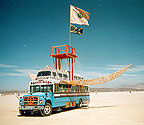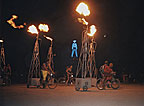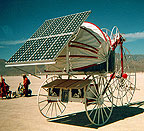Nowtopia - Burning Man
Burning Man
I went to Burning Man in 2003 as a self-designated “Official Scrutinizer,” with a brief questionnaire offering passersby heavy or light scrutiny. “Heavy scrutiny” meant a 45-minute audio interview, “light scrutiny” meant quickly scribbled answers to a dozen multiple choice questions. My “performance” led to twenty-four quality interviews and countless fantastic conversations. I wanted to explore class consciousness among participants, to find out who they were, what they did the rest of the year, how they contextualized the experience, etc.
Those I encountered filled a range of occupations: health educator/social worker, transportation planner, teacher, math professor (retired), testing and counseling of street kids, homeless youth study coordinator, welder/metal fabricator, software tester, human resources manager, environmental biochemist, teacher, freelance high tech research/marketing, handyman/auto mechanic, community development and technology consultant, computer repairman and apartment manager, teacher/ex-dot.com content provider, political organizer, immigration legal aide, veterinary assistant, house painter, builder, president marketing services/open source software company, and business/technology consultant.
They covered a full age range, too: seven were 23–30 and another seven were 32–40. Five each were 41–50 and 51–63. Of the thirteen women and eleven men I spoke with, the vast majority believed there is a ruling class (20), while their own class identification was confused at best: 7 middle class; 5 working class; 7 both; 3 neither; 2 didn’t know. Not surprisingly, nearly all of the respondents were white (though a smattering of people of color do attend). And due to my approach, the group was a self-selecting subset of the larger population, people drawn to the notion of “scrutiny,” analysis, thinking, reflection. It is difficult to generalize about 29,000 people (the attendance at Burning Man has topped 40,000 in the years after 2003), and perhaps not worth trying. Also, many have abandoned Burning Man over the years for a variety of reasons. This inquiry is not an attempt to confront all the criticisms or objections to Burning Man.
…
Most people who come to Burning Man would never say—or even think—so, but clearly the vast majority are part of the sprawling American working class. When they’re not at BM they have to go to work, mostly living from paycheck to paycheck and on credit. Once a year, for fun, they go on an expedition to the desert along with tens of thousands of others. And what do they do? They “set up” on the blank dusty slate of the white, flat playa. Then they live in a densely populated city and have a totally urban experience. But it’s a familiar and strangely different city life. The lack of infrastructure beyond porta-potties and the semi-circular layout of Black Rock City leaves room for the harsh nature of the desert to impose itself. Commerce is formally excluded (with the notable exceptions of ice and the Center Camp café).
I asked my scrutinees how they felt about the commitment to a cash-free “gift economy.” Most people were genuinely enthusiastic. Several emphasized that it was a major reason for their coming. “…I am so attracted to Burning Man because for close to a week I can exist without ever having to spend money, without ever having to worry about people asking for money—it’s just eliminated.” For a school teacher it is a “mental vacation, a sense of relief,” while a female metal worker thought it “kind of hypocritical,” mostly because of the espresso sales at Center Camp. One computer geek claimed “I would love to live in the gift economy 365 days a year!” Some of the lower wage participants, a handyman and a veterinary assistant, were adamant: “That’s why I come here,” and “I think life should be like this, it’s the only way to live.” A Berkeley apartment manager, who also fixes computers, described it as “a natural human impulse that is given free reign and encouraged here. It’s just a normal thing that people want to do.”
The commerce-free environment is “imperative. I wouldn’t come here otherwise,” said a street counselor, while a retired human resources staffer emphasized “it’s the thing that inspired me and drew me to Burning Man… Doing something because you love to do it rather than because you have to do it is always refreshing and wonderful…” For one person the commerce-free environment was a means to break down class assumptions based on consumption patterns. “Here nobody cares how much money I make because I have all these other things to offer. Also the people who have a lot of money are able to see people who maybe have almost nothing—they scrimp and they save every single penny they have to come here—[while] it’s just like another vacation for the wealthy.” Not that everyone “buys” the story Burning Man tells itself: “I don’t think it really is a commerce-free environment… it doesn’t mean much to me to have this contrived, one-week gift economy. I see efforts to create alternatives, or to transform the world we live in, [get] co-opted and integrated by the dominant society. There is a gift economy that already exists, the living culture in people’s daily lives, and Burning Man is a co-optation of it, selling it back to people. It’s a product, like ethical consumerism in some ways…”




